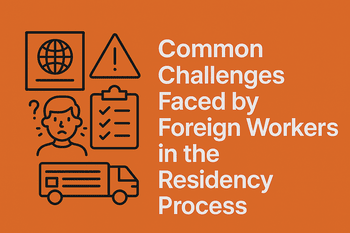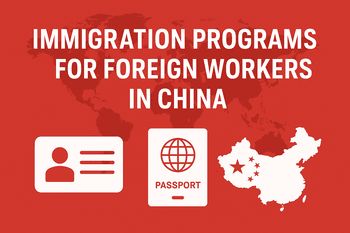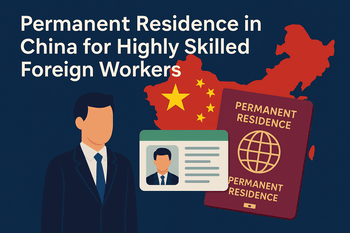
China has become a prime destination for professionals seeking global opportunities.
With its booming economy, diverse industries, and rich cultural heritage, many foreign workers arrive with hopes of establishing a permanent residence.
Yet, the journey toward securing permanent residency in China is not without hurdles.
In this post, we explore the primary challenges these workers face and discuss actionable strategies to overcome common pitfalls.
Understanding China’s Permanent Residency Process
Permanent residency in China—often referred to as the “Chinese Green Card”—is not as straightforward as in other nations.
Unlike countries with standardized point systems, China relies on a combination of strict eligibility criteria, extensive documentation, and an ever-evolving policy framework.
The process is bureaucratic and regionally variable, meaning that requirements and waiting times can differ from one city to another.
This complexity makes it even more essential for foreign workers to be well-prepared and informed before embarking on their application journey.
For many, the promise of securing the coveted Chinese permanent residency status brings hope for a stable future; however, missing even a single document or misunderstanding a requirement can lead to delays, rejections, or the need for resubmission.
Government websites, such as the Ministry of Public Security (in Chinese) and China Daily (in English), are reliable external sources for updated immigration policies, but understanding and navigating the process remains a significant challenge.
The Key Challenges
1. Stringent Eligibility Requirements
One of the most significant hurdles is meeting the rigorous eligibility requirements.
Unlike other popular expat destinations where the bar for permanent residency might be lower, China demands a high level of professional standing, financial stability, and contribution to either the local economy or society.
- Employment History: Often, foreign workers are expected to have a robust work record in China, typically spanning several years in a highly specialized field.
- Skill and Contribution: Applicants must demonstrate that they possess skills or expert knowledge that contribute uniquely to the Chinese economy.
- Local Investment or Tax Record: Some cases call for evidence of substantial local investment or a consistent tax payment record, which underscores the individual’s integration into the local financial ecosystem.
These criteria can seem daunting, particularly for workers whose roles may not neatly align with China’s prioritized sectors.
Proactively seeking professional advice—such as consulting an immigration lawyer or a reputable relocation agency—can help in understanding and meeting these stringent requirements.
2. Complex Documentation Requirements
The documentation process for permanent residency is exhaustive.
Applicants need to prepare and submit numerous documents, including employment contracts, tax returns, medical exams, and police clearance certificates.
Sometimes, there are additional regional requirements that vary from one province to another.
- Document Translation: All non-Chinese documents must be translated into Chinese by an accredited translator.
- Notarization and Legalization: Many documents require notarization or legalization, adding another layer of administrative responsibility.
- Consistency Is Key: Any inconsistency between different documents can raise red flags for immigration officials, leading to delays or even outright rejection of the application.
Documentation Checklist Table
| Challenge | Details | Suggested Solution |
|---|---|---|
| Stringent Eligibility | High work experience and skills criteria are required. | Obtain professional consultations early. |
| Extensive Documentation | Multiple documents in various formats need to be gathered and translated. | Start early and keep documents organized. |
| Translation and Legalization | Non-Chinese documents must be accurately translated and notarized. | Use certified translators and legal services. |
| Consistency Across Documents | Discrepancies may cause application delays or rejection. | Regularly review your documents for accuracy. |
| Regional Variability in Policies | Different provinces might require additional documents or criteria. | Check local immigration bureau websites beforehand. |
Note: Regularly consulting up-to-date government websites or immigration forums (e.g., China Residency Forum) can help in keeping track of regional variations and updates.
3. Language Barriers and Cultural Nuances
Language is often a significant obstacle in dealing with official Chinese documents and communications.
Most government documents are written in Mandarin, and even though many business professionals speak English, the language barrier can be a source of misinterpretation.
- Official Translations: It is crucial to have all documents accurately translated by recognized professionals. Even minor errors can lead to the application being delayed or rejected.
- Cultural Etiquette: Understanding local cultural nuances is essential when navigating bureaucratic processes. A respectful and patient approach in interactions—be it in person or over the phone—can make a significant difference.
Engaging a local expert or cultural liaison can simplify this process. Cultural training sessions or language courses may also prove beneficial for foreign workers who intend to stay long-term.
4. Bureaucratic Delays and Administrative Hurdles
The administrative burden involved in China’s residency process is daunting.
Issues include long waiting periods, lack of clear guidance from officials, and frequent bureaucratic delays.
Many applicants report that even after submitting all the correct documents, the waiting time for a final decision can be unexpectedly long.
- Processing Times: Vary widely depending on the applicant’s case, the region, and even fluctuations in policy.
- Inconsistent Communication: Some workers face challenges in receiving timely updates on their application status, which can be stressful and demanding.
- Appeal Process: In case of rejection, the requirements and procedures for appeals are not always straightforward.
Using tracking systems, when available, and maintaining regular contact with the responsible immigration office can help mitigate some of these delays.
Additionally, enlisting professional help to liaise with government offices can smooth out many of the administrative hurdles.
5. Evolving Policies and Regulatory Uncertainty
Perhaps one of the most unpredictable challenges arises from the frequent changes in immigration policies.
China’s approach to foreign labor and residency is subject to shifts based on economic conditions, political decisions, or international relations.
- Policy Updates: New guidelines are introduced periodically, sometimes altering eligibility criteria, document requirements, or processing times.
- Unpredictability: What was acceptable a year ago might not meet the new standards laid out by the government today.
- Local vs. National Standards: Some cities have additional requirements that diverge from national guidelines, making it imperative for applicants to stay informed.
To keep up with these changes, foreign workers should closely monitor official announcements and participate in expat networks that offer updated information and experiences.
Websites like China Briefing provide current news and analyses which can be an invaluable resource.
Practical Tips to Overcome These Challenges
Start Early and Prepare Proactively
The permanent residency application process in China is time-consuming.
Begin collecting all necessary documents well ahead of time and maintain an organized digital and physical archive.
Preparation includes having all papers notarized, translated, and certified as needed.
Hire Professional Assistance
Given the complexities, consider hiring an immigration consultant or attorney experienced in Chinese immigration laws.
These experts can clarify regulations, help you prepare complete documentation, and even mediate with local authorities on your behalf.
Professional support can be the difference between a smooth process and a prolonged struggle.
Learn the Language and Understand the Culture
Investing in Mandarin language classes can facilitate smoother interactions with government officials.
Additionally, understanding cultural subtleties—such as the right form of address and manner of communication—can foster goodwill during official interviews.
Stay Informed and Up-to-Date
Regularly check official websites and join expat or foreign worker forums.
Platforms like China Daily and China Briefing ensure you receive timely updates on policy shifts that might affect your application.
An informed applicant is better prepared to adapt to regulatory changes quickly.
Create a Timeline and Checklist
A detailed timeline that includes application milestones, document submission deadlines, and follow-up dates will serve as an invaluable guide throughout the process.
Here’s a simple table to serve as a starting point:
| Step | Action Required | Estimated Duration |
| Research & Consultation | Gather updated guidelines and consult experts | 2-4 weeks |
| Document Preparation | Compile, translate, notarize, and validate documents | 1-2 months |
| Submission & Review | Submit documents and await initial review feedback | 3-6 months |
| Follow-Up & Additional Requests | Regular updates and potential appeals if needed Varies | (6-12 months) |
| Final Decision & Issuance | Final approval and receiving permanent residency documentation | 1-3 months |
Network with Fellow Expats
Building a network of other foreign workers who have navigated the process can offer unique insights and moral support.
Their experiences can inform you of pitfalls to avoid and strategies that yielded success.
Conclusion
The journey to achieving permanent residency in China is fraught with challenges—from stringent eligibility requirements and complex documentation to bureaucratic delays and evolving policies.
However, with the right preparation, professional guidance, and a proactive approach in adapting to changes, many foreign workers successfully navigate these hurdles and embrace a new life in China.
For anyone considering this path, it’s crucial to remain patient, resourceful, and vigilant with updates from official channels.
While the road may be challenging, the prospect of integration into one of the world’s most dynamic economies can be immensely rewarding.
Additional Resources:
- Ministry of Public Security of China – For official guidelines and updates.
- China Daily – For news and analysis on immigration trends in China.
- China Briefing – For in-depth articles and regulatory updates.


